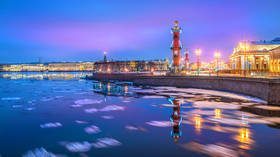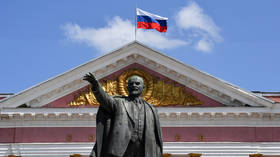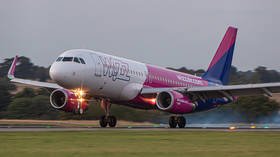Bring Leningrad back – Communists

Nikolay Kharitonov, the Communist candidate for the Russian presidency, has endorsed a referendum to decide whether to rename St. Petersburg as Leningrad again and vowed to give Volgograd its old name – Stalingrad.
Kharitonov is challenging the incumbent President Vladimir Putin in the March 17 election, on behalf of the Communist Party of the Russian Federation (KPRF). He was asked about the city names at a press conference on Monday.
“You elect me, the very next day I will take up that issue,” Kharitonov said. All of Russia should decide on the naming of St. Petersburg in a referendum, he explained, adding that the Stalingrad issue didn’t even need a debate.
“Volgograd, the city where the back of the fascist vermin was finally broken, should return the name Stalingrad without any further discussion!” he said.
His comments came a day after the 100th anniversary of the death of Vladimir Ilyich Lenin, the founder of the Soviet Union whose name was bestowed on the former northern capital from 1924 to 1991.
Saint Petersburg (City of St. Peter) was founded in 1703 by Russian Emperor Peter the Great. The original Dutch spelling of its name was Sankt-Pieter-Burch, but swiftly shifted to the more Germanic Sankt Petersburg. In 1914, Emperor Nicholas II had it renamed Petrograd – a translation first used by the legendary poet Alexander Pushkin almost a century earlier – amid a tide of anti-German feelings triggered by the First World War.
Following the 1917 October Revolution, the northern capital first became Red Petrograd, and then Leningrad, as it was known during the USSR. Its original Germanic-sounding name was restored in 1991, but the Soviet moniker lives on in the surrounding Leningrad Region.
The story of Stalingrad is somewhat different. Lenin’s successor Joseph Stalin had commanded the Bolshevik units that took the city – then known as Tsaritsyn – during the Russian Civil War, so it was renamed in his honor in 1925. In 1942-43 it became the site of the fiercest battle of the Second World War, and the total defeat of the Wehrmacht’s 6th Army.
Stalin’s successor Nikita Khrushchev changed the city’s name to Volgograd in 1961, as part of the “de-Stalinization” campaign in the USSR. Since 1991, there have been multiple petitions to rename it either Tsaritsyn or Stalingrad again.
In 2013, the local authorities allowed the use of “Hero City Stalingrad” on nine specific dates every year, including the start and end dates of the Battle of Stalingrad (August 23 and February 2), the anniversary of the Soviet ‘Operation Uranus’ counteroffensive (November 19), the anniversary of the Nazi invasion (June 28), and Victory Day (May 9).














